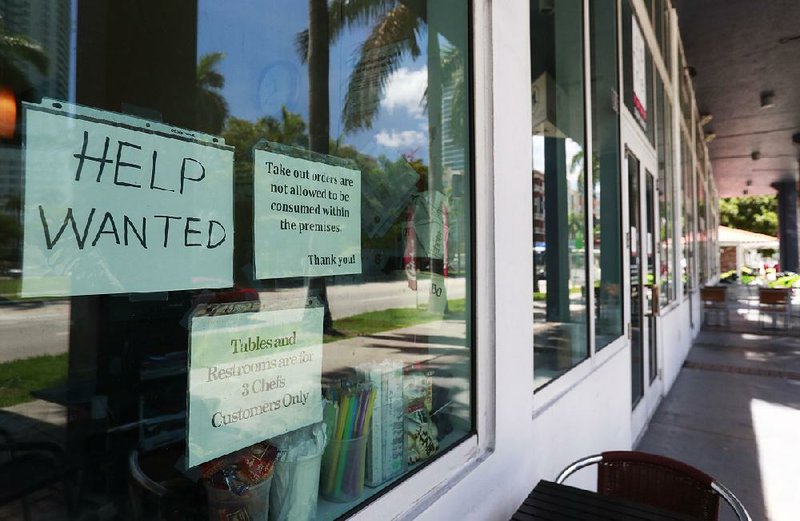WASHINGTON -- Job openings posted by U.S. employers slipped 0.7% in May, while hires that month tumbled 4.4% in a sign that the job market may be cooling slightly.
The Labor Department said Tuesday that employers posted 7.3 million jobs in May. They hired 5.7 million, down from the record 6 million achieved in April.
The report -- known as job openings and labor turnover survey -- suggests that employers remain optimistic about economic growth, but that their pace of expected hiring has slowed somewhat after more than a decade of economic expansion has pushed down the jobless rate. The number of job openings declined from a record 7.6 million.
"Today's numbers are an indication that 2019 will see a slower pace of improvement in the labor market," said Nick Bunker, an economist at Indeed, a jobs site. "Last year's growth was quite strong, and a comedown from those highs makes sense."
Fewer workers left their jobs in May, as the number of separations declined 192,000 to 5.5 million. There was a meaningful decline in the number of people in Southern states who quit their jobs. An increase in the number of people quitting is usually an indication that the economy is improving, since people depart their jobs with the confidence that they can find new ones with higher pay. But a decline in those numbers could signal that the job market has lost some of its previous momentum.
The number of total hires eased, reflecting fewer additions in professional and business services, health care, and leisure and hospitality.
On Friday, the government said employers added 224,000 jobs in June as the unemployment rate ticked up slightly to 3.7%.
Americans are generally satisfied with their personal finances, but many lack confidence in their ability to afford retirement, an emergency expense or even their daily living costs, according to a survey by The Associated Press-National Opinion Research Center's Center for Public Affairs Research.
Roughly two-thirds, 67%, described their financial situation as generally good, up slightly from 62% of the respondents who said so at the start of the year.
Their brighter economic outlook reflects in part a decade-long U.S. economic expansion that is now the longest on record. But some groups, especially young adults, racial minorities and the poor, say they remain financially insecure.
The richest Americans now hold a greater share of the nation's wealth than they did before the recession began in 2007.
Housing and college costs have imposed a much heavier strain on today's young adults than they did on older generations. And four decades of sluggish pay growth have depressed starting salaries for people who are beginning their careers.
Nearly 4 in 10 Americans said they lack confidence in their ability to pay an emergency expense of $1,000. At the same time, about 1 in 10 said it's very likely they wouldn't pay the bill at all, even if it meant taking a loan, relying on a credit card or borrowing money from relatives.
Two in 10 were very confident that they'll have enough savings for retirement. Nearly half said they have little to no confidence.
A quarter of those polled said their expenses are rising faster than their incomes. Just 11% said their salaries have outpaced their costs. (The rest say their incomes have largely kept pace with expenses.)
Many older Americans have managed to build financial security through homeownership and traditional pensions, which most employers have now phased out. About three-quarters of those ages 60 and over reported feeling good about their financial situations.
By contrast, 4 in 10 Americans under 30 described their financial situation as poor. Half said they doubt their ability to handle an unplanned bill -- twice the proportion of people ages 60 and older.
"Millennials are on a much lower path of wealth-building than their older predecessors," said Reid Cramer, director of the millennials initiative at the New America Foundation, a Washington-based think tank.
The poll of 1,116 adults was conducted June 13-17 using a sample drawn from the research center's probability-based AmeriSpeak Panel, which is designed to be representative of the U.S. population. The margin of sampling error for all respondents is 4 percentage points.
Information for this article was contributed by Josh Boak and Emily Swanson of The Associated Press; and by Ryan Haar of Bloomberg News.
Business on 07/10/2019
